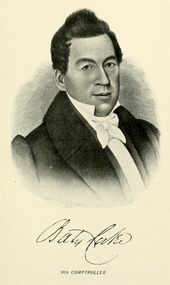Bates Cooke
Bates Cooke (born December 23, 1787 in Wallingford , Connecticut , † May 31, 1841 in Lewiston , New York ) was an American politician . Between 1831 and 1833 he represented the state of New York in the US House of Representatives .
Career
Bates Cooke attended public schools in his home country. Then he took part in the British-American War . In 1814 he was the mayor of the municipality of Cambria . After studying law and his admission as a lawyer around 1815, he began to work in Lewiston in this profession. Politically, he joined the Anti-Masonic Party .
In the congressional election of 1830 Cooke was elected to the US House of Representatives in Washington, DC , in the 30th constituency of New York , where he succeeded Ebenezer F. Norton on March 4, 1831 . Since he renounced another candidacy in 1832, he could only complete one legislative period in Congress until March 3, 1833 . Ever since President Andrew Jackson took office in 1829, there has been heated debate within and outside of Congress about its policies. It was about the controversial enforcement of the Indian Removal Act , the conflict with the state of South Carolina , which culminated in the nullification crisis , and the banking policy of the president.
Between 1839 and 1841, Bates Cooke was the New York State Comptroller . From May 14, 1840 he was also a bank officer. He died in Lewiston on May 31, 1841.
Web links
- Bates Cooke in the Biographical Directory of the United States Congress (English)
| predecessor | Office | successor |
|---|---|---|
| Ebenezer F. Norton |
United States House of Representatives for New York (30th constituency) March 4, 1831 - March 3, 1833 |
Philo C. Fuller |
| personal data | |
|---|---|
| SURNAME | Cooke, Bates |
| BRIEF DESCRIPTION | American politician |
| DATE OF BIRTH | December 23, 1787 |
| PLACE OF BIRTH | Wallingford , Connecticut |
| DATE OF DEATH | May 31, 1841 |
| Place of death | Lewiston , New York |


